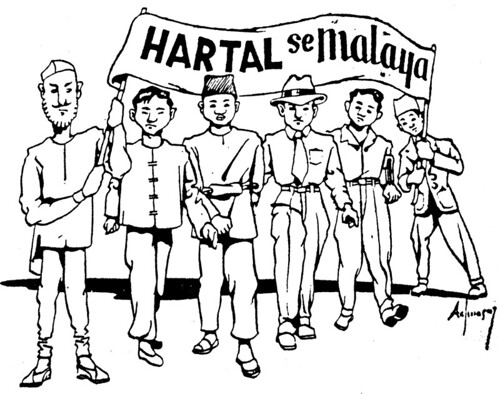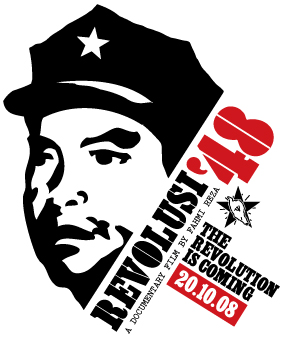 WHAT MIGHT HAVE BEEN AND STILL COULD BE
WHAT MIGHT HAVE BEEN AND STILL COULD BE
by Lee Wei Lian
Given that this is the golden anniversary of Malaysia's independence — though technically, Malaysia didn't exist till 1963 — I am choosing the topic of national unity for my year-end commentary. You must be wondering of course, what the topic of national unity is doing in a section on technology and innovation? Well, it's an important issue, one that is central to any country's success and, unfortunately for us, it's an issue that has become like some sort of eternal black hole, sucking in much attention, time and energy, but with no good results. But I will also make an effort to segue from national unity to the innovative use of technology.
Having travelled through a number of multi-ethnic, multi-lingual societies, I must acknowledge the difficulties that come with knitting diverse tribes into a cohesive whole. In 1997, I was in Canada watching tears roll down the cheeks of a lady making a plea on national TV to French-speaking Quebecois to vote against separation in a secession referendum. I have been to Barcelona, Spain, where people prefer to refer to themselves as Catalan rather than Spanish. I visited Bilbao, also in Spain, and heart of Basque country where there is also more pride in being Basque than Spanish and separatist organisations like ETA use bombs to prove that point. Belgium has been the object of pundit affection lately because of the odds of it crumbling into its Flemish and Wallonian constituent parts.
There are of course, my favourite examples.
I once took a train journey from Geneva to Bern in Switzerland. The train was spotless and right on schedule as expected. But what amazed me was that the conductor checking tickets spoke French in the Geneva canton (the Swiss version of a state) and when the train was travelling through the Bern canton less than an hour later, the very same conductor switched smoothly to German. Yet, the country is fiercely united and very successful. I read recently that tennis great Roger Federer, who hails from the German speaking town of Munchenstein, trained at the Swiss National Tennis Center in French speaking Eculbelns, even though his French was not very good at the time. Yet today, he is without peer in the tennis world and claimed proudly by all Swiss. Basel, a city that speaks both French and German, is the centre of gravity for the pharmaceutical industry. Whether in the field of finance, fancy watches or Nobel prizes, peculiarly diverse Switzerland is a global leader.
Then there is the US — the most ethnically diverse nation on earth and the only superpower to boot. I spent nearly half a decade in the US observing how Iranians, Jews, Whites, Blacks, Asians and Latinos live together in many ways similar to how Malays, Chinese, Indians, Kadazans and Ibans live together in Malaysia. One major difference though, is how, over there, national identity is emphasised so much more compared to here. Anything and everything there is about being an American, unlike here. And that, I believe is the reason unity is fragile in Malaysia while in the US, it is not. How can you unite when there is no identity to unite under?
But it didn't have to be this way. Way back in 1946, there was a courageous attempt by civil society right here in Malaysia, to architect a nation, where I believe, the national unity would have been a lot stronger than today. Thanks to YouTube, I was able to watch 10 Tahun Sebelum Merdeka (10 Years Before Independence) by Fahmi Reza at my convenience. According to the documentary, compiled from eyewitness accounts and newspaper reports, there was an alternative constitution proposed for Malaya in 1946, called the People's Constitution. This constitution proposed that Malaya gain its independence and all who call it their real home would be known as Malays. That's right — Malays. Also proposed in the document was that all would get equal political rights but with special protection for Malays, there would be a council to combat racial discrimination and Singapore would be part of Malaya. Four hundred thousand copies of the People's Constitution in three languages were distributed. Judging from comments left on the Internet, after many viewers got over the shock of being kept ignorant of the People's Constitution, their next reaction is that they cannot believe how enlightened the drafters of the document were back then.
When the British ignored this democratic cry for independence, on Oct 20, 1947, about 10 years before Merdeka, Malayans went on a nationwide strike. Railways, towns and rubber estates were silent for 22 days [Sebenarnya mogok hartal berlaku selama 18 jam dari 6 pagi hingga 12 tengah malam pada 20 Okt 1947. -Ed] — that was how widespread the support was for the People's Constitution. If the voice of the people had been heeded back then, well, we'd all be Malays today and putting an extra 10 candles on our birthday cake. But the powers in control back then decided to rubbish it in favour of an alternative constitution drawn up together with Umno, which created the Federation of Malaya in 1947. This effectively divided society, therefore delineating and strengthening racial fault lines that persist to this day and weakened the foundations for a strong national identity. That's not all. They also threw many of the people involved in promoting and drafting the People's Constitution, including some 10,000 Malays, into jail.
In an interview with theSun, Fahmi said that the drafters of the People's Constitution "wanted to give birth to a new bangsa. They were conscious about breaking the Malay-Chinese-Indian racial categorisations. They wanted to forge a new nationality regardless of race".
I personally believe a national identity forged by the people for the people in esprit de corps would have led to stronger unity than one imposed from above.
The documentary is a moving one. To make it, Fahmi interviewed members of organisations that made the People's Constitution possible. There was Lim Kean Chye (Malayan Democratic Union) and Yahya Nassim Hussein (Parti Kesatuan Melayu Malaya) [Parti Kebangsaan Melayu Malaya -Ed], among others. The music, sometimes haunting, at other times stirring, can make your hair, literally, stand on end. And their stories, animated by battle-scarred faces nearly 90 years old, can bring tears to your eyes. Some moments can be amusing, as when Yahya touches on the issue of flags: "Kenapa nak taruk keris kat situ? (Why do you want to put a keris on it?)" Other moments are sad like when he relates how certain parties tried to turn Malays against the Chinese and Indians using a technique known as "Ah Chong-Ramasamy." I guess some things don't change, even today.
Despite being made for a bare-bones budget of just RM5,000, I find 10 Tahun a better film than many US$100-million (RM336 million) productions from Hollywood. Technology, of course, is why this is possible. It is unlikely Fahmi could have achieved the same quality and audience at this cost 10 years ago. With digital cameras, PC-based editing applications and YouTube, anyone with the passion and talent can make and distribute quality docufilms.
Which brings me to how technology can help build national unity. The Internet is a marvelous platform where diverse groups can meet and mingle despite being in physically remote locations. Discussion in blogs and other forums are largely unfettered and self-regulated and, as we can see, no riots have broken out because of it. On the contrary, discussions show that the pygmification of the Malaysian intellect is not yet complete and, through interaction, understanding is deepened. It can also be a repository for alternative views. Fahmi's 10 Tahun is an alternative retelling of our nation's history and is now part of the global knowledge bank and accessible to all no matter what the Ministry of Education chooses to do with Sejarah textbooks. I'm just waiting for someone to do a documentary on Hang Tuah and certain momentous events in the nation's history. It can also be a way for anthropologists and sociologists to gain insight into the thinking and aspirations of the nation. And perhaps a place for people to organise civil-society initiatives for unity as there is a sense of great freedom on the Internet, perhaps in some sense similar to the feeling of the post war years, of which Lim says: "There was a general feeling of liberation in the air." So happy birthday Malaysia and may your next 50 be more united than the last.
Sumber: theedgedaily.com, 4 Jan 2008
Isnin, Januari 07, 2008
Artikel dari The Edge Daily, 4 Jan 2008
Dicatat oleh
Fahmi Reza
di
7:37 PG
![]()
Kategori: Liputan Media
Langgan:
Catat Ulasan (Atom)








Tiada ulasan:
Catat Ulasan